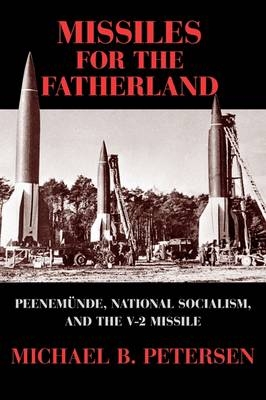
Missiles for the Fatherland
Peenemünde, National Socialism, and the V-2 Missile
Seiten
2011
Cambridge University Press (Verlag)
978-0-521-28340-3 (ISBN)
Cambridge University Press (Verlag)
978-0-521-28340-3 (ISBN)
Missiles for the Fatherland was the first scholarly investigation of the culture underpinning missile development at Germany's secret missile base at Peenemünde. Michael Petersen's research reveals a complex interaction of professional ambition, internal cultural dynamics, military pressure, and political coercion, which coalesced daily life at the facility.
Missiles for the Fatherland tells the story of the scientists and engineers who built the V-2 missile in Hitler's Germany. This text was the first scholarly history of the culture and society that underpinned missile development at Germany's secret missile base at Peenemünde. Using mainly primary source documents and publicly available oral history interviews, Michael Petersen examines the lives of the men and women who worked at Peenemünde and later at the underground slave labor complex called Mittelbau-Dora, where concentration camp prisoners mass-produced the V-2. His research reveals a complex interaction of professional ambition, internal cultural dynamics, military pressure, and political coercion, which coalesced in daily life at the facility. The interaction of these forces made the rapid development of the V-2 possible but also contributed to an environment in which stunning brutality could be committed against the concentration camp prisoners who manufactured the missile.
Missiles for the Fatherland tells the story of the scientists and engineers who built the V-2 missile in Hitler's Germany. This text was the first scholarly history of the culture and society that underpinned missile development at Germany's secret missile base at Peenemünde. Using mainly primary source documents and publicly available oral history interviews, Michael Petersen examines the lives of the men and women who worked at Peenemünde and later at the underground slave labor complex called Mittelbau-Dora, where concentration camp prisoners mass-produced the V-2. His research reveals a complex interaction of professional ambition, internal cultural dynamics, military pressure, and political coercion, which coalesced in daily life at the facility. The interaction of these forces made the rapid development of the V-2 possible but also contributed to an environment in which stunning brutality could be committed against the concentration camp prisoners who manufactured the missile.
1. Help build the spaceship!; 2. At Peenemunde, they have created a paradise; 3. It was a fantastic life!; 4. Production by convicts: no objections; 5. At the limits of existence; 6. We still had a fatherland to fight for; 7. Engineering consent at Peenemunde.
| Erscheint lt. Verlag | 16.6.2011 |
|---|---|
| Reihe/Serie | Cambridge Centennial of Flight |
| Zusatzinfo | Worked examples or Exercises |
| Verlagsort | Cambridge |
| Sprache | englisch |
| Maße | 152 x 229 mm |
| Gewicht | 430 g |
| Themenwelt | Natur / Technik ► Fahrzeuge / Flugzeuge / Schiffe ► Militärfahrzeuge / -flugzeuge / -schiffe |
| Geschichte ► Allgemeine Geschichte ► Neuzeit (bis 1918) | |
| Geisteswissenschaften ► Geschichte ► Regional- / Ländergeschichte | |
| Sozialwissenschaften ► Politik / Verwaltung | |
| Technik | |
| ISBN-10 | 0-521-28340-X / 052128340X |
| ISBN-13 | 978-0-521-28340-3 / 9780521283403 |
| Zustand | Neuware |
| Haben Sie eine Frage zum Produkt? |
Mehr entdecken
aus dem Bereich
aus dem Bereich
von der Machtergreifung bis zur Gründung der Vereinten Nationen
Buch | Softcover (2023)
Motorbuch Verlag
CHF 38,90


